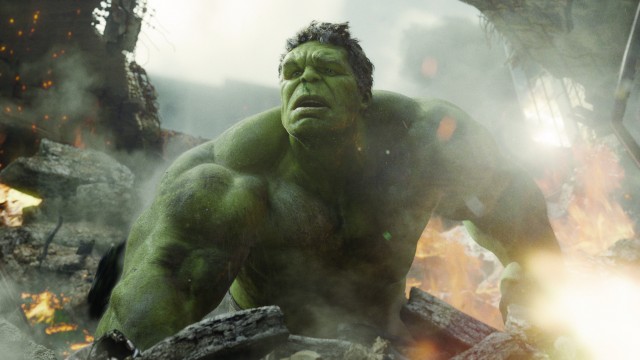The Incredible Hulk is, perhaps, the most challenging of the mainstream comic book superheroes. He has many of the same origin story beats as other characters: childhood trauma leads to a desire for peace and justice followed by a mutation or adaptation. Batman saw his parents killed before he turns into a brooding beast of justice and toys. Superman’s whole civilization was destroyed before he even had a memory, and now considers Earth (and America) to be his adopted home. Spider-Man was a teenage outcast with dead parents who mutated with accidental nuclear radiation. Hulk suffered through an abusive childhood and then mutated through his own nuclear explosion financed by the government.
Since the origin story often feeds into the superhero character, each has a different style to their justice. Superman is generally seen as the Golly Gee All-American nationalistic wholesomeness who believes in government and a peaceful prosperous people. He’s salt of the Earth and willing to work with various world leaders to ensure a peaceful life. Batman is a Randian 1%er who believes in protecting property from petty criminals, believes in the rights of a peaceful people, but is also distrustful of the government’s ability to act in anybody’s best interest. Spider-Man, similar to Superman, is a more wholesome jovial chap who is willing to stop crime, but he’s largely having fun with it. And, then there’s Hulk.
Hulk is a raging festering pile of neuroses. Young Bruce Banner was severely abused, emotionally and physically, by his father. The abuse he suffered caused him to repress his emotions, and trained him to keep his emotions repressed. Meanwhile, the ball of fear and anger seeded in his childhood, fed throughout his life by common everyday repressions, grew large enough to cause a Dissociative Personality Disorder triggered by a nuclear explosion. Banner’s DPD came with a physical change on top of the personality change, and Hulk because its own character growing out of a more peaceful person.
When Hulk is angry or scared, he transforms from a mild-mannered person into a larger-than-life embodiment of rage and pain. Sometimes his form of justice is laser-focused, but frequently it has be deployed with an all-encompassing blanket of violence aimed at anything perceived as contributing to the injustice. Because one of sources of Hulk’s transformation is the military industrial complex, Hulk frequently has to lash out at armies and buildings in order to properly protect himself and others. Hulk’s pain is so large that it has the power to destroy.
The Incredible Hulk #1 was released in May 1962, after the Bay of Pigs, and just as Kennedy was starting to escalate American military presence in Vietnam. From 1959 through 1963, the American military presence went from 900 “Advisers” to 16,000 troops. With this political atmosphere, Hulk’s origin story at being transformed by a military experiment takes on an even greater political edge, pointing towards the oncoming 1960s protest movement.
1962 was also right in the middle of the primary wave of American Civil Rights Movement. In 1957, in Monroe, North Carolina, the KKK attacked the house of an NAACP member, and was met with an armed resistance. In 1959, when white men were acquitted of sexually assaulting black women, the president of the Monroe chapter of the NAACP, Robert F Williams, said he would meet violence with violence. By 1963, race riots were breaking out sparked by injustices or in defense of racial targeting. The 1963 Birmingham riots were sparked by bombs targeting civil rights leaders.
Hulk, in a way, embodies the dual force of the 1960s. Bruce Banner is a mild-mannered man while Hulk is just pure unfocused anger, both ultimately seeking solace for themselves and their community. The involuntary nature of Hulk’s appearances makes him a very volatile character, and one which provides an easy metaphor for violence in the argument between violence and non-violent protesting.
In the wake of the ongoing riots in Baltimore, another iteration of the same riots in Ferguson and across the country, Hulk’s political metaphor becomes increasingly clear. We don’t see Hulk as a villain, but as a hero to be feared. Hulk is the embodiment of pain and oppression. When we watch uprisings around the world, we see the pain and oppression that comes from those communities rising up in a righteous anger. We see the uprisings through the eyes of the Hulk. When America sees the same uprisings coming from an American community (black, poor, radical, etc), we see it through the eyes of Bruce Banner. We cease seeing it from the point of view of the oppressed (Hulk) and start viewing it through the eyes of the peaceful (Bruce Banner). We want to repress these impulses, and pray that peaceful pleas for justice will work. In the world of The Incredible Hulk, you need both; both the peaceful marches and the violent uprisings are required to right the wrongs of the world. He’s not wrong.

